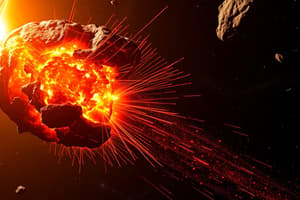Podcast
Questions and Answers
What is the key difference between background extinction and mass extinction?
What is the key difference between background extinction and mass extinction?
- Background extinction is a natural process, while mass extinction is always caused by human interference.
- Background extinction occurs at a slower rate, while mass extinction occurs at a faster rate. (correct)
- Mass extinction is caused by natural disasters, while background extinction is caused by human activities.
- Mass extinction leads to a decrease in biodiversity, while background extinction leads to an increase in biodiversity.
What was the primary cause of the mass extinction that led to the demise of the dinosaurs?
What was the primary cause of the mass extinction that led to the demise of the dinosaurs?
- The spread of disease-causing agents like bacteria and fungi.
- Habitat destruction and degradation by early human civilizations.
- The impact of a large meteor in the Yucatan peninsula that decreased oxygen levels. (correct)
- A series of volcanic eruptions that increased greenhouse gases and global temperatures.
Which of the following is not considered a direct cause of species extinction?
Which of the following is not considered a direct cause of species extinction?
- Increased biodiversity. (correct)
- Introduction of exotic species.
- Pollution.
- Habitat destruction and degradation.
How has the rate of species extinction changed compared to the historical, natural rate?
How has the rate of species extinction changed compared to the historical, natural rate?
What are some of the indirect causes of species extinction mentioned in the text?
What are some of the indirect causes of species extinction mentioned in the text?
Which of the following natural causes of mass extinction is not mentioned in the text?
Which of the following natural causes of mass extinction is not mentioned in the text?
What term describes the process by which pollutants enter a food chain through the organism in the first trophic level?
What term describes the process by which pollutants enter a food chain through the organism in the first trophic level?
Which statement best describes the impact of habitat fragmentation on biodiversity?
Which statement best describes the impact of habitat fragmentation on biodiversity?
What is the main concern associated with nonnative species introduced to new habitats?
What is the main concern associated with nonnative species introduced to new habitats?
Which activity is a direct cause of overexploitation contributing to species extinction?
Which activity is a direct cause of overexploitation contributing to species extinction?
What effect does eutrophication have on aquatic ecosystems?
What effect does eutrophication have on aquatic ecosystems?
Which process leads to an increase in the concentration of pollutants from one organism to another in a food chain?
Which process leads to an increase in the concentration of pollutants from one organism to another in a food chain?
What is the main cause of species extinction according to the text?
What is the main cause of species extinction according to the text?
Which event is NOT listed as a natural cause of species extinction in the text?
Which event is NOT listed as a natural cause of species extinction in the text?
What type of extinction event involves a sudden, widespread decrease in biodiversity?
What type of extinction event involves a sudden, widespread decrease in biodiversity?
Which species mentioned in the text was impacted by overhunting for food and skin?
Which species mentioned in the text was impacted by overhunting for food and skin?
What is the key difference between background extinction and mass extinction events?
What is the key difference between background extinction and mass extinction events?
Which human activity mentioned in the text contributed to the extinction of the Cebu Warty Pig?
Which human activity mentioned in the text contributed to the extinction of the Cebu Warty Pig?
Flashcards are hidden until you start studying




